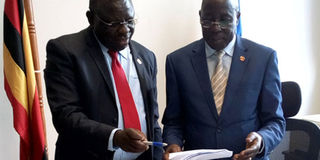Government unveils plan to audit public service delivery

Consultations. State minister for Economic Monitoring in the office of the President Kasirivu Atwooki (right) with Mr Vincent Tumusiime, a director in charge of economic affairs and research during the launch of the monitoring camps in Kampala recently. PHOTO BY EPHRAIM KASOZI
What you need to know:
- Move. Monitoring camps will be set up to focus on the status of service delivery in priority sectors.
Kampala.
The directorate of socio-economic monitoring and research in the Office of the President has launched a plan to monitor and evaluate delivery of public services in the country.
Under the arrangement, State minister for Economic Monitoring Kasirivu Atwooki, said ministry officials will hold monitoring camps throughout the country to get feedback from service recipients on efficiency and effectiveness.
“Despite various government monitoring interventions, there are still gaps in the approaches. These include limited collaboration among oversight institutions, poor utilization of monitoring findings and recommendations, lack of adequate capacity, limited engagement of stakeholder and poor information sharing mechanisms,” Mr Kasirivu said.
He revealed that the monitoring camps will focus on the status of service delivery in priority sectors of agriculture, health and education which have huge potential in promoting economic growth and reducing poverty.
Priority sectors
Under the National Development Plan II (NDP II), agriculture, health and education are priority sectors in the growth of the economy.
NDP II emphasises commercialisation of agriculture to increase productivity along value chains, agro-processing and marketing as a launch-path to industrialisation and increasing the stock of skilled and healthy workforce towards the production of human capital to accelerate the realisation of demographic dividend.
Addressing journalists in Kampala recently, Mr Kasirivu explained that government has an obligation to provide public services to its citizens and to steer economic growth and development.
Statistics show that Uganda has registered remarkable progress in economic growth and poverty reduction with the economy’s Gross Domestic Product growth rate averaged at 7.0 per cent from the 1990 to 2010.
According to Mr Vincent Tumusiime, a director in charge of economic affairs and research in the Office of the President, poverty has been reducing over the years.
“In 1992/93, more than half of the population (56.4 per cent) lived below the poverty line of $1.90 and by 2012/13; the rate had dropped significantly to a national average of 19.7 per cent,” he said.
He added: “The eastern and northern regions continue to lag behind with poverty levels above the national average; the eastern region at 24.1 per cent and the northern at 43.7 per cent,”
Mr Tumusiime observed that despite tremendous investment in the key sectors, there are several challenges such as poor design, implementation management, poor supervision, bureaucratic tendencies, and corruption have hindered the programmes to reach the intended beneficiaries.
He revealed that the maiden monitoring camp will cover the northern districts of Acholi and Lango sub-regions.



